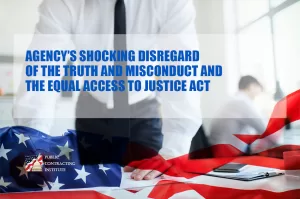In a precedent-setting case, the Court of Federal Claims found that there was a good reason to award more than the minimum $125 hourly rate for attorney fees under the Equal Access to Justice Act (“EAJA”). In Starry Associates, Inc. v. United States, (Fed. Cl. No. 16-44C), March 31, 2017, the court held that the numerous examples of agency misconduct during the procurement process as well as the “shocking disregard of the truth by the agency” warranted the application of a “special factor” award granting the protester the higher amount of actual attorney fees that were billed. The proceedings involved three protests at the Government Accountability Office (“GAO”) and one protest at the Court of Federal Claims, ultimately resulting in victory for Starry Associates.
Starry protested an award issued by the Department of Health and Human Services (“HHS”) Program Support Center (“PSC”) for business operations services. In PSC’s evaluation of the two offerors, two members of the technical evaluation panel noted that Intellizant, LLC, the intended awardee, was unable to meet all elements of the statement of work. Notwithstanding the fact that Intellizant’s proposal was technically unacceptable, the PSC source selection authority (the contracting officer) decided to make award to Intellizant.
Starry Associates initially protested the failure to comply with the solicitation requirements at the GAO, and the agency informed GAO that it intended to re-evaluate proposals. The same member of the technical evaluation panel again found Intellizant technically unacceptable, but the contracting officer again decided to award to Intellizant. Starry Associates protested a second time at the GAO, alleging non-compliance with the solicitation, and also alleging that the PSC accounting director was biased in favor of Intellizant because he was a former employee of that company. GAO found no bias, based on a hearing where the accounting director represented to GAO that he had “recused himself from the procurement process.” GAO did recommend a reevalution of Intellizant’s proposal.
Instead of re-evaluating, the PSC agency counsel advised contracting personnel that they could cancel the solicitation and reprocure or amend the current solicitation. The head of the PSC contracting department canceled the procurement, asserting that the services sought duplicated services provided in another HHS contract. Starry Associates protested a third time at the GAO, alleging bias, but the GAO denied the protest.
Starry Associates then protested at the Court of Federal Claims, which held that “the entire procurement process was deeply flawed, culminating in a completely unsupported decision to cancel the solicitation.” Starry Associates then filed an application for attorney fees and other eligible expenses under EAJA.
EAJA permits a prevailing party other than the United States to recover fees if it was the prevailing party and the government’s position was not substantially justified. Starry Associates was clearly the prevailing party. The government bears the burden of proving that its conduct was substantially justified based on a standard of reasonableness. The Court concluded that “at no point was the government’s position reasonably justified based on the law or the facts.”
The court then considered the question of EAJA’s “special factor” on attorney fees. EAJA provides for recovery of such fees up to $125 per hour, except (1) where a cost of living adjustment raises the amount or (2) there is a special factor that justifies a higher amount. Although not defined, one source of a special factor is the “limited availability of qualified attorneys,” but the statute makes it clear that this is not the only special factor—that is left to the courts to decide on a case by case basis.
Although the court noted that there had been no prior examples of use of a special factor, except the cost of living adjustment, the particular circumstances of this case justified an award of attorney fees at the actual amount billed because of the egregious agency intransigence and deception (at GAO and the Court), and the need to have agency procurements conducted fairly and transparently-which did not happen here.
The Court pointed to the following:
- After the first GAO protest, the agency promised to reevaluate proposals, but this was a misrepresentation, since HHS did not conduct a meaningful evaluation
- At the second GAO protest, the agency misled GAO by submitting a statement by the PSC accounting director that he had “recused” himself from the procurement, but he was directly involved in picking evaluation panel members and he had been consulted during the evaluation process
- In the third GAO protest, the agency again made misrepresentations concerning redundancies in the services solicited, which GAO accepted without further investigation and denied the protest.
The court concluded that the “extreme measures that plaintiff was forced to pursue to vindicate its right to a rational and lawful federal procurement process, combined with the shocking disregard of the truth by the agency, justify an award at higher than the default [EAJA] rate.” The court included a footnote that “nothing represented or implied by [Department of Justice] defense counsel during this suit was intended to be untruthful. We assume that, like plaintiff and GAO before them, counsel took agency representation at face value. As held above, however, that cannot excuse the fact that doing so was not reasonable.”
The message here is important. Agencies must conduct all procurements fairly and transparently. Agency misconduct, including egregious conduct or misrepresentations to offerors, to the GAO or to the Court, will result in significant penalties.

